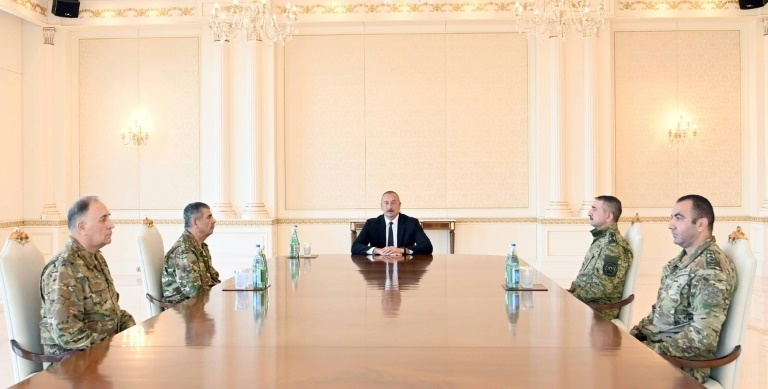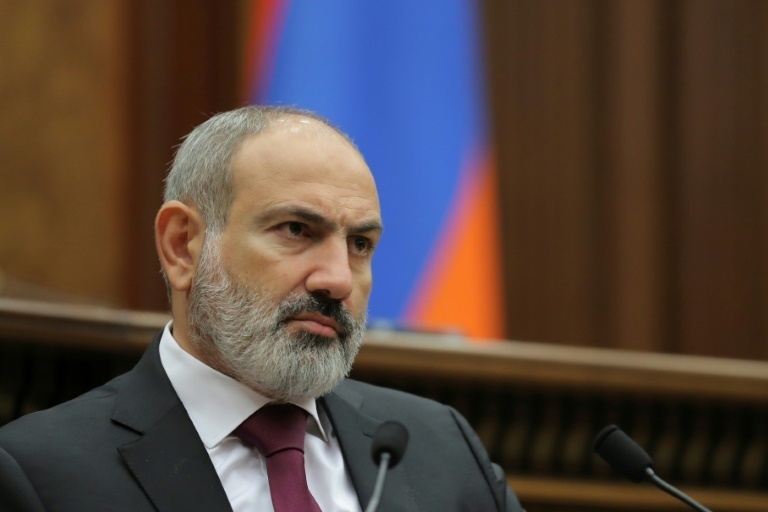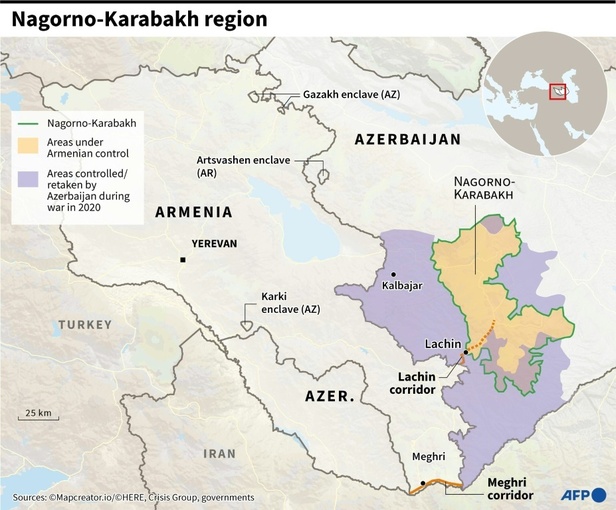Azerbaijan said Tuesday its military succeeded in preventing attacks by Armenian troops in the wake of the worst fighting between the arch-foes since their brief but brutal war in 2020.
Armenia announced that nearly 50 of its soldiers had been killed in the fighting overnight, which Russia said it had halted by brokering a ceasefire between the historic rivals.
"Provocations committed by Armenian forces on the border have been prevented and all necessary objectives were fulfilled," President Ilham Aliyev's office said in a statement after his meeting with the military leadership.
Armenia appealed to world leaders for help after the fighting broke out, accusing Azerbaijan of trying to advance on its territory.
United States Secretary of State Antony Blinken on Tuesday called the leaders of both protagonists, with his spokesman saying Washington would "push for an immediate halt to fighting and a peace settlement" between the neighbours.
The fighting was the worst since the end of a 2020 war between the ex-Soviet republics over the contested Nagorno-Karabakh region that left more than 6,500 killed on both sides.

Russia said it had brought the clashes to a halt, with the foreign ministry saying a ceasefire was agreed from 9:00 am Moscow time (0600 GMT).
Armenia's defence ministry said later that clashes had subsided but that the situation on the border "remains extremely tense".
After fighting broke out, Prime Minister Nikol Pashinyan called French President Emmanuel Macron, Russian President Vladimir Putin and Blinken to demand "an adequate reaction" to "Azerbaijan's aggressive acts".
Later, addressing lawmakers, he said at least 49 Armenian soldiers had been killed in the flare-up.
- 'Subversive acts' -
Azerbaijan said it had also suffered casualties but did not specify the number killed.
The defence ministry in Yerevan said the clashes started early Tuesday, with Armenian territory coming under fire from artillery, mortars and drones in the direction of the cities of Goris, Sotk, and Jermuk.
"The enemy is trying to advance" into Armenian territory, it said in a statement.

Baku's long-standing political and military sponsor Turkey blamed Armenia and urged it instead to "focus on peace negotiations".
Iran, which shares a border with both countries, urged "restraint" and a "peaceful resolution" to the fighting.
The European Union, France and the United States have expressed concerns over the escalation and called for an end to the fighting.
Before the ceasefire was announced, Armenia's security council asked for military help from Moscow, which is obligated under a treaty to defend Armenia in the event of foreign invasion.
- 'Russia in bad shape' -
Armenian political analyst Tatul Hakobyan said the escalation in fighting was a consequence of the "deadlock" in Armenian-Azerbaijani peace talks.
"Azerbaijan wants to force Armenia to recognise Karabakh as part of Azerbaijan," he told AFP.
"The war in Ukraine has changed the balance of forces in the region and Russia –- which is a guarantor of peace in the region –- is in a very bad shape. In this situation, Azerbaijan wants to get concessions from Armenia as soon as possible," he added.
Last week, Armenia accused Azerbaijan of killing one of its soldiers in a border shootout.
In August, Azerbaijan said it had lost a soldier and the Karabakh army said two of its troops had been killed and more than a dozen wounded.
The neighbours fought two wars -- in the 1990s and in 2020 -- over the Nagorno-Karabakh region, Azerbaijan's Armenian-populated enclave.
The six weeks of brutal fighting in the autumn of 2020 ended with a Russian-brokered ceasefire.
Under the deal, Armenia ceded swathes of territory it had controlled for decades and Moscow deployed about 2,000 Russian peacekeepers to oversee the fragile truce.
During EU-mediated talks in Brussels in May and April, Azerbaijani President Ilham Aliyev and Pashinyan agreed to "advance discussions" on a future peace treaty.
Ethnic Armenian separatists in Nagorno-Karabakh broke away from Azerbaijan when the Soviet Union collapsed in 1991. The ensuing conflict claimed around 30,000 lives.
mkh-eg-im/jbr/cdw
© Agence France-Presse
Your content is great. However, if any of the content contained herein violates any rights of yours, including those of copyright, please contact us immediately by e-mail at media[@]kissrpr.com.
Source: Story.KISSPR.com

